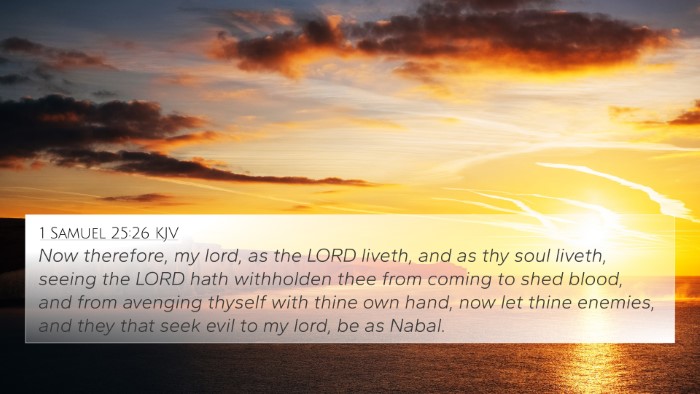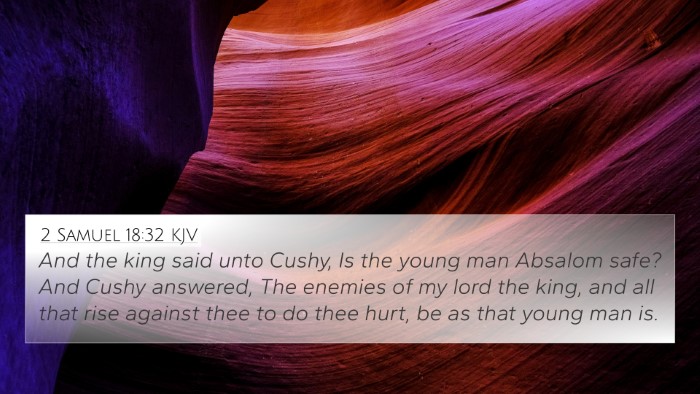Old Testament
Genesis Exodus Leviticus Numbers Deuteronomy Joshua Judges Ruth 1 Samuel 2 Samuel 1 Kings 2 Kings 1 Chronicles 2 Chronicles Ezra Nehemiah Esther Job Psalms Proverbs Ecclesiastes Song of Solomon Isaiah Jeremiah Lamentations Ezekiel Daniel Hosea Joel Amos Obadiah Jonah Micah Nahum Habakkuk Zephaniah Haggai Zechariah MalachiJob 27:7 Similar Verses
Job 27:7 Cross References
Let mine enemy be as the wicked, and he that riseth up against me as the unrighteous.
Uncover the Rich Themes and Topics of This Bible Verse
Listed below are the Bible themes associated with Job 27:7. We invite you to explore each theme to gain deeper insights into the Scriptures.
Job 27:7 Cross Reference Verses
This section features a detailed cross-reference designed to enrich your understanding of the Scriptures. Below, you will find carefully selected verses that echo the themes and teachings related to Job 27:7 KJV. Click on any image to explore detailed analyses of related Bible verses and uncover deeper theological insights.

1 Samuel 25:26 (KJV) »
Now therefore, my lord, as the LORD liveth, and as thy soul liveth, seeing the LORD hath withholden thee from coming to shed blood, and from avenging thyself with thine own hand, now let thine enemies, and they that seek evil to my lord, be as Nabal.

2 Samuel 18:32 (KJV) »
And the king said unto Cushy, Is the young man Absalom safe? And Cushy answered, The enemies of my lord the king, and all that rise against thee to do thee hurt, be as that young man is.

Daniel 4:19 (KJV) »
Then Daniel, whose name was Belteshazzar, was astonied for one hour, and his thoughts troubled him. The king spake, and said, Belteshazzar, let not the dream, or the interpretation thereof, trouble thee. Belteshazzar answered and said, My lord, the dream be to them that hate thee, and the interpretation thereof to thine enemies.
Job 27:7 Verse Analysis and Similar Verses
Understanding Job 27:7
Job 27:7 states:
"Let my enemy be as the wicked, and he that rises up against me as the unrighteous."
This verse encapsulates Job's fervent declaration of innocence amidst his suffering. It is an appeal to the justice of God and highlights the stark contrast between the righteous and the unrighteous. Below, we will explore the insights garnered from notable public domain commentaries on this verse, emphasizing various cross-references and connections to enhance our understanding.
Summary of Commentaries
- Matthew Henry: Henry interprets this verse as Job's expression of his understanding that there is a clear differentiation between the righteous and the wicked. His hope rests on the eventual vindication that righteousness will bring, positing that the fate of the wicked stands in stark contrast to that of the just.
- Albert Barnes: Barnes emphasizes that Job is essentially calling for a divine reckoning. He stresses that every enemy of the righteous, represented here, shall find themselves in the position of the wicked ultimately. This sets a thematic precedent for divine justice.
- Adam Clarke: Clarke points out that this verse serves as a bold declaration of Job’s faith and a warning to his adversaries. He underscores the moral significance of integrity and how those who oppose God’s chosen will face His wrath, ultimately linking the individual struggles of Job to a broader principle of justice.
Thematic Connections and Cross-References
Job 27:7 can be cross-referenced with several significant biblical passages that underline the themes of justice, righteousness, and divine retribution. These connections not only bolster the understanding of this verse but also display a consistent biblical narrative.
- Psalm 1:5-6: "Therefore the wicked will not stand in the judgment, nor sinners in the assembly of the righteous." This verse echoes Job's standpoint on the ultimate outcome for both the righteous and the wicked.
- Malachi 3:18: "And you shall differentiate between the righteous and the wicked, between one who serves God and one who does not serve Him." This is a direct affirmation of the distinction Job makes.
- Proverbs 11:21: "Be assured, an evil person will not go unpunished, but the offspring of the righteous will be delivered." Here we see a parallel in the theme of divine justice portrayed in Job's assertion.
- Matthew 7:2: "For with what judgment you judge, you will be judged; and with the measure you use, it will be measured back to you." This New Testament connection guides us to reflect on the moral implications of judgment and retribution that Job encapsulates.
- Galatians 6:7: "Do not be deceived, God is not mocked; for whatever a man sows, that he will also reap." A reinforcement of Job's statement regarding the fate of those who rise against the righteous.
- Lamentations 3:34-36: "To crush underfoot all prisoners of the earth, to deny a man justice in the presence of the Most High, to subvert a man in his cause— the Lord does not approve." This aligns with Job's appeal for a just assessment of his situation.
- Romans 12:19: "Beloved, do not avenge yourselves, but rather give place to wrath; for it is written, 'Vengeance is Mine, I will repay,' says the Lord." This references the ultimate justice that God ensures, tying back to Job’s faith in divine justice.
- Isaiah 3:10-11: "Say to the righteous that it shall be well with them, for they shall eat the fruit of their deeds. Woe to the wicked! It shall be ill with him, for the reward of his hands shall be given him." This reflects the punishment promised to the wicked, resonating with Job’s assertion.
- 2 Timothy 4:14: "Alexander the coppersmith did me much harm. May the Lord repay him according to his works." This verse from the New Testament highlights the intention of invoking divine justice against adversaries.
Inter-Biblical Dialogue
Moreover, Job 27:7 invites us into a broader conversation throughout scripture. The themes that emerge from this text—justice, righteousness, and divine retribution—are not isolated to the book of Job but are recurrent throughout the entirety of the Bible. Each cross-reference invites deeper exploration of how these verses relate and provide affirmation to Job’s plight.
Tools for Bible Cross-Referencing
Understanding the interconnections between biblical passages can greatly enhance one’s study. Here are some recommended tools for effective Bible cross-referencing:
- Bible Concordance: A comprehensive index of biblical words and their occurrences across various verses.
- Bible Cross-Reference Guide: A structured layout of scriptures categorized by their themes and topics.
- Cross-Reference Bible Study: Grouped verses that share thematic links for comparative analysis.
- Bible Reference Resources: Various materials aiding in the understanding of biblical texts and their intricate connections.
- Bible Chain References: A method of connecting scriptures that lead the reader through thematic trails.
Conclusion
In sum, Job 27:7 serves as a profound assertion of Job's integrity and faith amidst calamity. Through this verse and its connections to various other scriptures, readers are invited to explore the rich tapestry of biblical themes surrounding justice and morality. The tools provided above can assist in drawing meaningful connections between these verses, offering a more profound understanding of their importance and relevance in biblical narratives.
SEO Keywords: Bible verse cross-references, connections between Bible verses, linking Bible scriptures, comparative Bible verse analysis, and more.


